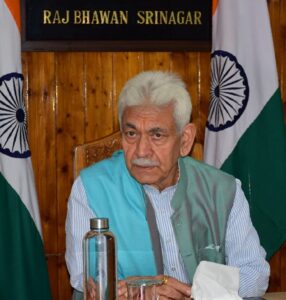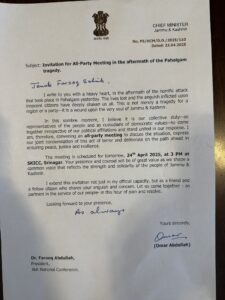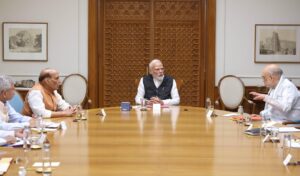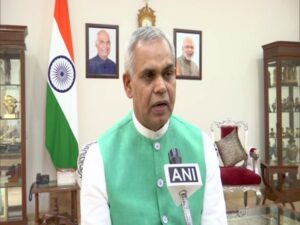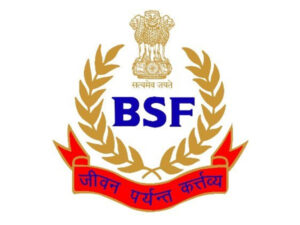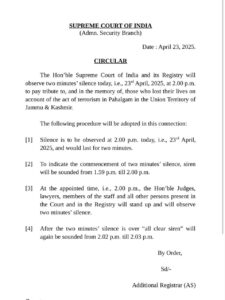“Heartfelt gratitude”: Gujarat CM thanks PM Modi after cabinet approves National Maritime Heritage Complex project
Gandhinagar (Gujarat) [India], October 9 (ANI): Gujarat Chief Minister Bhupendra Patel on Wednesday expressed gratitude to Prime Minister Narendra Modi after the union cabinet approved the National Maritime Heritage Complex (NMHC) project in Lothal, Gujarat.
CM Bhupendra Patel posted on X that the NMHC will boost growth in the region and help the local communities. Adding to that, he said NMHC will help tourists and visitors, researchers and scholars, government bodies, educational institutions, cultural organisations, NGOs and businesses.
“Heartfelt gratitude to PM @narendramodi ji and union cabinet for giving approval to the development of world-class National Maritime Heritage Complex (NMHC) in Lothal in Gujarat. While showcasing India’s 4500 years old rich and diverse maritime heritage, NMHC will boost growth and immensely help the local communities, tourists and visitors, researchers and scholars, government bodies, educational institutions, cultural organisations, NGOs and businesses,” CM Patel said.
Emphasizing the numbers, CM Patel said that this complex will create 22,000 direct and indirect jobs in the region.
He further said, “It will be the world’s greatest Maritime complex once it is developed fully and will create around 22,000 direct and indirect jobs. Features including Lighthouse museum, ship building experience, docks, old Lothal town etc. will make this complex truly unique, transporting the visitors to a different era.”
The Union Cabinet today approved the development of the National Maritime Heritage Complex (NMHC) in Gujarat’s Lothal.
Union Minister Ashwini Vaishnaw stated that the museum at Lothal will be the largest maritime heritage complex in the world.
Briefing the media after the Union Cabinet meeting, Vaishnaw said, “Today, the Cabinet approved the development of a National Maritime Heritage Complex at Lothal in Gujarat. The proposal aims to showcase India’s rich and diverse maritime heritage and create the largest maritime heritage complex in the world.”
The maritime project at Lothal will be completed in two phases. The Union Cabinet has granted in-principle approval for Phases 1B and 2, based on the master plan. Funds will be raised through voluntary contributions, and construction will commence once the necessary resources are secured.
The construction of the Lighthouse Museum under Phase 1B will be funded by the Directorate General of Lighthouses and Lightships (DGLL).
A separate society will be established for the development of future phases, governed by a Governing Council headed by the Minister of Ports, Shipping & Waterways, under the Societies Registration Act, 1860. This body will oversee the implementation, development, management, and operation of the NMHC at Lothal, Gujarat.
Phase 1A of the project is currently underway, with over 60% of the physical work completed. It is expected to be finished by 2025.
Phases 1A and 1B will be developed in EPC mode, while Phase 2 will be developed through land subleasing or a public-private partnership (PPP) to establish NMHC as a world-class heritage museum.
The development of the NMHC project is expected to create around 22,000 jobs, with 15,000 direct and 7,000 indirect employment opportunities.
Furthermore, the implementation of NMHC aims to boost growth and significantly benefit local communities, tourists, researchers, scholars, government bodies, educational institutions, cultural organisations, environmental and conservation groups, and businesses.
Phase 1A will feature an NMHC museum with six galleries, including an Indian Navy & Coast Guard gallery, which is expected to be one of the largest in the country. It will showcase external naval artefacts, a replica model of Lothal township surrounded by an open aquatic gallery, and a jetty walkway.
Phase 1B will add eight more galleries, a Lighthouse Museum, which is planned to be the world’s tallest, a Bagicha complex with parking for about 1,500 cars, a food hall, and a medical centre.
Phase 2 will include Coastal State Pavilions developed by respective coastal states and union territories, a hospitality zone featuring a maritime-themed eco-resort and “museotels,” a recreation of the real-time Lothal city, a maritime institute and hostel, and four theme-based parks.

